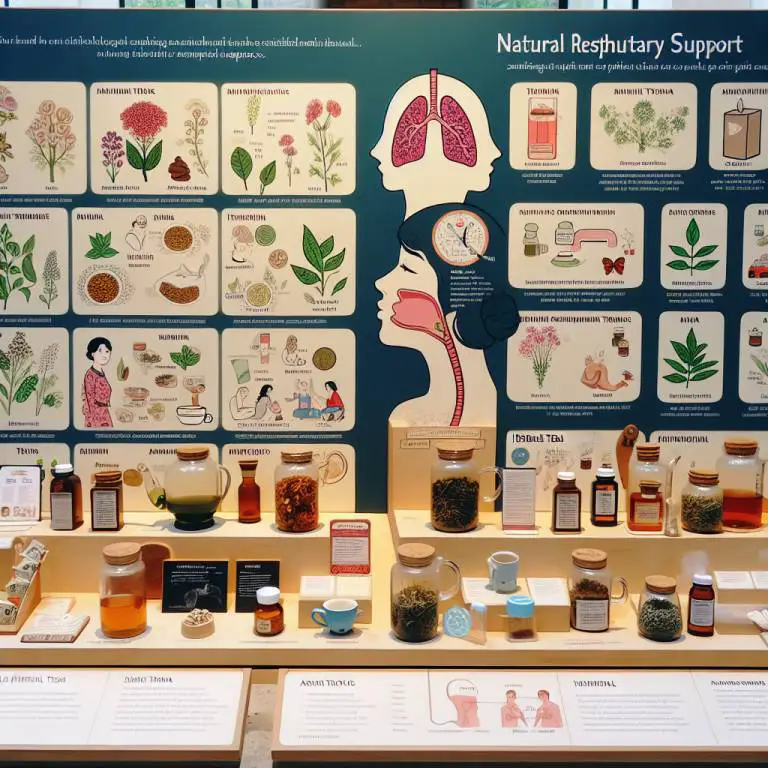Comparing the anti-inflammatory properties of different herbal teas for asthma
When comparing the anti-inflammatory properties of herbal teas for asthma relief, ginger tea stands out due to its strong anti-inflammatory effects that can help reduce airway inflammation. Peppermint tea is also beneficial as it contains menthol, which helps relax the muscles of the respiratory tract. Chamomile tea is known for its antioxidant properties that can soothe the body’s inflammatory response. These teas offer natural ways to alleviate asthma symptoms by targeting inflammation.

What are the anti-inflammatory properties of ginger tea for asthma relief?
Ginger tea is known for its strong anti-inflammatory properties, which can be very helpful for people with asthma. Asthma is a condition where the airways become inflamed and narrow, making it hard to breathe. Ginger tea helps by reducing this inflammation, allowing for easier breathing.
The active components in ginger, such as gingerols and shogaols, play a crucial role in its health benefits. These substances help to relax the airway muscles and reduce airway constriction. This makes ginger tea an excellent natural remedy for those seeking relief from asthma symptoms.
Which compounds in green tea can benefit asthma sufferers?
Green tea is rich in antioxidants and contains several compounds that can benefit individuals with asthma. The most notable of these compounds are catechins and epigallocatechin gallate (EGCG). These antioxidants help to reduce inflammation in the lungs and improve lung function.
Besides its anti-inflammatory effects, green tea also has bronchodilator properties. This means it can help widen the air passages in the lungs, making it easier for asthma sufferers to breathe. Drinking green tea regularly may provide long-term benefits for managing asthma symptoms.
Find out how tea can help with asthma. Discover effective varieties and their preparation tips.
How does peppermint tea alleviate symptoms of asthma?
Peppermint tea contains menthol, which is known for its soothing effect on the throat and ability to improve breathing. Menthol works by relaxing the muscles of the respiratory tract, thereby reducing the symptoms of wheezing and coughing associated with asthma.
In addition to menthol, peppermint tea has antioxidant properties that help fight inflammation within the airways. This dual action makes peppermint tea a beneficial drink for those looking to ease their asthma symptoms naturally.
Can chamomile tea reduce inflammation in the airways?
Chamomile tea is another herbal remedy that has been used for centuries due to its medicinal properties. It contains several compounds like flavonoids that have anti-inflammatory effects. For people with asthma, drinking chamomile tea may help reduce inflammation in the airways, providing relief from common symptoms such as tightness in the chest and difficulty breathing.
Moreover, chamomile has natural relaxant qualities that can help soothe muscle tension around the airways. This relaxation can lead to improved airflow and reduced discomfort during an asthma attack. Regular consumption of chamomile tea might offer additional support in managing chronic symptoms associated with asthma.
| Herbal Tea | Active Anti-inflammatory Compounds | Effectiveness for Asthma |
|---|---|---|
| Ginger Tea | Gingerols, Shogaols | High – Helps in relaxing airways, reducing airway inflammation |
| Green Tea | Epigallocatechin gallate (EGCG) | Moderate to High – Reduces inflammation and allergic reactions involved in asthma |
| Turmeric Tea | Curcumin | High – Potent anti-inflammatory effect, can reduce symptoms of asthma |
| Peppermint Tea | L-Menthol | Moderate – May relieve breathing difficulties by relaxing the muscles of the respiratory tract but can be an allergen to some individuals with asthma. |
| Chamomile Tea | Bisabolol, Matricin, Apigenin | Moderate – Has anti-inflammatory and antioxidant properties; however, its effectiveness specifically for asthma needs more research. |
| Licorice Root Tea | Glycyrrhizin | Moderate to High – Helps in reducing bronchial spasms, clearing mucus from the lungs. Note: Should be used cautiously due to potential side effects when consumed in large amounts. |
Is licorice root tea effective in managing asthma symptoms?
Licorice root tea is known for its soothing properties, which can be beneficial for people with asthma. It helps by relaxing the muscles in the airway, making it easier to breathe. This effect can reduce the severity of asthma symptoms, such as shortness of breath and wheezing.
Moreover, licorice root has anti-inflammatory qualities that help reduce swelling in the airways. This can further aid in easing breathing difficulties commonly experienced by asthma sufferers. However, it’s important to consume licorice root tea in moderation as excessive intake can lead to side effects.
What role does turmeric tea play in controlling asthma inflammation?
Turmeric tea contains curcumin, a compound known for its potent anti-inflammatory effects. In the context of asthma, curcumin helps by reducing inflammation in the airways, which is a key factor in asthma attacks. Drinking turmeric tea regularly may help manage chronic inflammation associated with asthma.
Additionally, turmeric enhances the body’s antioxidant defenses. This means it can help protect the lungs from damage caused by free radicals, potentially reducing the frequency and severity of asthma attacks. Including turmeric tea in one’s diet could be a natural way to support overall lung health.
How do the antioxidants in rooibos tea assist with asthma?
Rooibos tea is rich in antioxidants like aspalathin and nothofagin, which have been shown to have beneficial effects on health. For individuals with asthma, these antioxidants can help combat oxidative stress within the respiratory system. Oxidative stress is known to exacerbate inflammation and trigger asthma symptoms.
The anti-inflammatory properties of rooibos tea also play a crucial role in managing asthma symptoms. By reducing inflammation in the airways, rooibos tea can help alleviate breathing difficulties and provide relief during an asthma attack. Its natural soothing effect makes it a great choice for daily consumption by those seeking natural remedies for their condition.
Final Thoughts
Incorporating herbal teas such as licorice root, turmeric, and rooibos into one’s diet could offer additional support for managing asthma symptoms naturally. These teas are known for their anti-inflammatory and antioxidant properties that target key aspects of asthma pathology.
However, it’s essential to remember that while these teas can complement traditional treatments, they should not replace prescribed medications without consulting a healthcare provider. Always consider personal allergies and sensitivities when trying new herbal remedies for asthma management.






